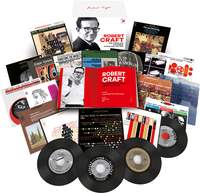Box Set Deep-Dive,
Rob Cowan on Robert Craft
I don’t remember whose version I chose (Robert Craft’s wasn’t locally available at the time) but what I do recall is that our guest hated it: he likened it to kids messing about in a back yard aping what they thought the ‘modern music’ of the day should sound like. I sort of get where he was coming from, but had Craft’s shrewdly erotic rendition (issued here in stereo for the first time in the UK) been to hand I think his reaction might have been rather different.
Craft, best-known as Stravinsky’s assistant and a fearless promoter of modern music generally, brooked no compromise with the works he performed. The players and singers in his charge were by and large first-rate. Schoenberg’s knotty Suite Op. 29 - which incorporates elements of old tonality into dodecaphony (ie, with no distinction between harmony and dissonance) – features violinist Israel Baker, whose warmly seductive playing can be heard on hundreds of recordings next to the likes of Jascha Heifetz, Stravinsky, Ella Fitzgerald and Tom Waits, while his film studio work includes the score for Psycho. Craft once told me that no matter what music he put in front of Baker, simple or complex, he’d play it accurately and beautifully.
Discs 2-5, all of them devoted to the absorbingly gnomic essays of Anton Webern (also available separately on Sony), sound as if they were recorded in a small-shed hideaway somewhere, the line-up including the sweet-voiced soprano Marni Nixon, otherwise known as the ‘ghost singer’ for the soundtracks West Side Story (Natalie Wood), The King and I (Deborah Kerr) and My Fair Lady (Audrey Hepburn).
Musically, we’re offered eight kaleidoscopic volumes of ‘The Music of Arnold Schoenberg’ where Craft coaxes from his musicians intensely communicative performances of, for example, the shocking masterpiece Erwartung ('Expectation'), where at dead of night a panic-stricken woman (Helga Pilarczyk) searches for her missing lover only to stumble across his corpse. Baker plays the Violin Concerto as if it were by Brahms (Schoenberg would have been delighted) and Craft is truly aflame at the head of the Chicago Symphony in Schoenberg’s technicoloured orchestration of Brahms’s First Piano Quartet, with its wild, Gipsy-style finale.
Pelleas und Melisande and Verklärte Nacht evoke heated Wagnerian vistas while Craft and Glenn Gould turn the Piano Concerto into a model of musical logic. A double-album of Gould surveying Schoenberg’s songs and solo piano music doesn’t involve Craft, but as it’s presented as Volume Four of ‘The Music of Arnold Schoenberg’, Sony have included it anyway. A wise move surely. Works dealing with the Schoenberg’s Jewish faith – and the Holocaust in particular – strike an uplifting but austere note.
Featured works by Alban Berg – whose music influenced such masters of the film music genre as Leonard Rosenman and Leonard Bernstein – include the Chamber Concerto (Baker again), the Three Pieces of Orchestra and the four symphonic excerpts from Berg’s unfinished opera Lulu. The latter in particular is magnificently performed.
Numerous pieces featured are by the sixteenth-century madrigalist Don Carlo Gesualdo, Prince of Venosa, who aside from penning radical music haunts history as the murderer of his wife, her lover (in flagrante delicto) and his – or maybe their - offspring. Try 'Beltà poi che t’assenti' ('Beauty, since you Depart' CD 41, track 4) and ask yourself if the music you’re listening to is ancient or modern. My guess is that ‘modern’ will be your most likely answer.
Choral music by two more sixteenth-century masters, Claudio Monteverdi (Vespers of the Blessed Virgin) and Heinrich Schütz also features, as do variously scored works by Bach (two cantatas, as well as music orchestrated by Schoenberg and Webern), Mozart (Piano Concerto No. 24 with Gould), Schubert (arranged by Webern), Debussy, and, moving forwards, Boulez, Stockhausen and of course Stravinsky.
It was Craft who tutored Stravinsky in the controversial musical manners of the Second Viennese School, his third and final musical period, and a couple of those works are also included. We additionally have three versions of the striking ballet-cantata Les Noces (The Wedding): the original version for soloists, chorus and chamber orchestra; a couple of scenes with similar vocal forces plus pianola, two cimbaloms, harmonium and percussion and, finally, the most familiar version where the instrumental contribution comes via percussion and four pianos. All are sung in Russian. And if Danses concertantes doesn’t get you up and prancing around nothing will.
So what in essence is Robert Craft’s musical legacy? Put rather glibly, I’d say that he had the gift of making new music sound old and old music sound new. His approach is fresh, intense, vital and self-renewing. Which means Wagnerian Schoenberg, Schoenbergian Stravinsky, Mahlerian Berg, Bachian Webern and so forth. He’s the ideal guide for this dazzling cornucopia and he spares no effort in getting the music across. The transfers from analogue sources, whether in mono or (as are the majority) in stereo, are superb.
Robert Craft
Available Format: 44 CDs




